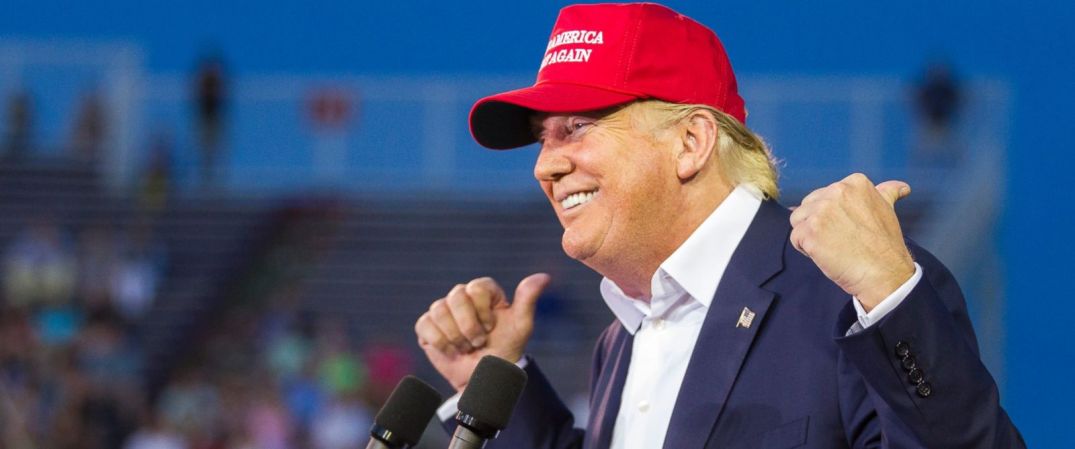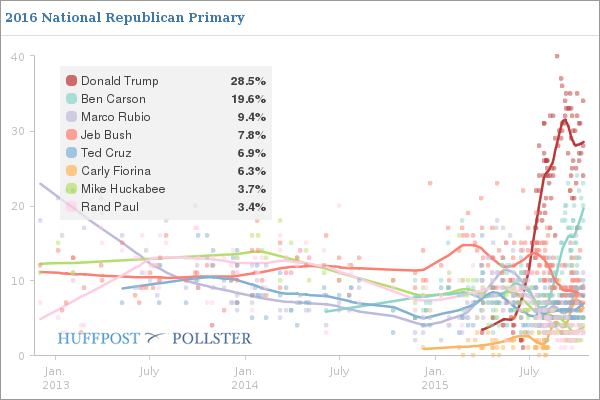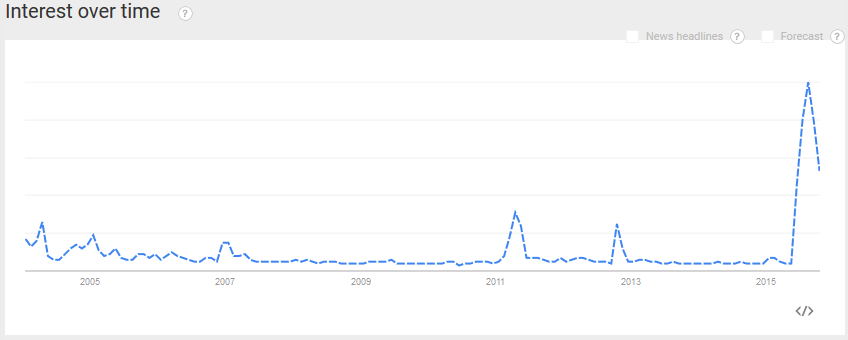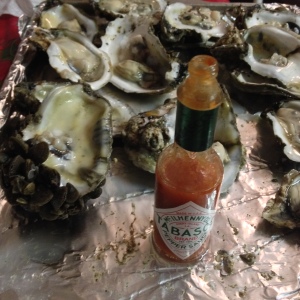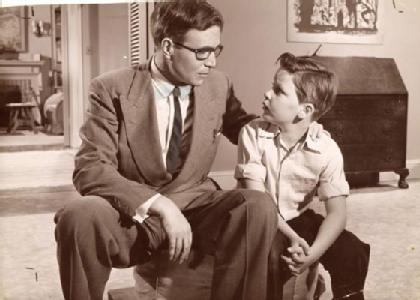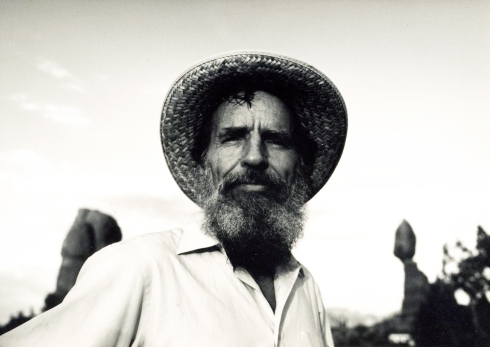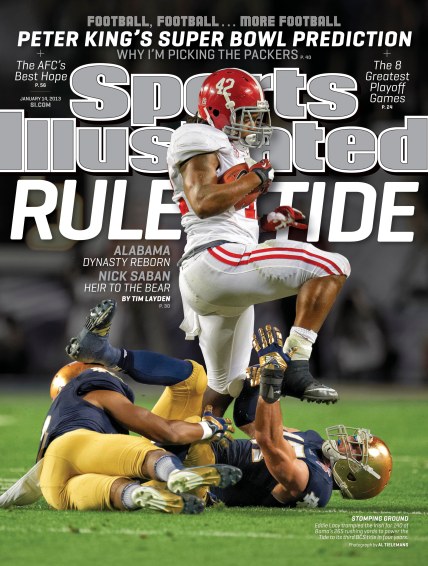As Donald Trump prepares to host Saturday Night Live — a move under protest by Latino advocates, and one that may cause the FCC’s “Equal Time” rule to trigger free air time for other candidates* — the old adage that forms the bedrock of western sensibilities of humor leaps to mind:
Tragedy + Time = Comedy
The idea — probably from Steve Allen in the ’50s — is that, given enough time, the sting of something cataclysmic disappears or, at the very least, diminishes enough that it’s no longer so sacrosanct and becomes fodder for ribbing or, in some cases, outright mockery. Trump’s latest foray into comedy, though, is redundant. His campaign has been hilarious since day one.
I don’t mean to say that he isn’t a serious contender. Because plugging our collective ears and stomping our feet doesn’t make reality go away:
Though Carson’s numbers and Trump’s numbers are headed for what Wall Street calls a ‘Death Cross,’ — just like they did on June 22 when Trump overtook Dr. Carson, a longtime target for the GOP — The Donald is still the clear front-runner. His campaign, based on pure ‘could this actually happen’ value is very, very real.
A June NBC/WSJ poll put Trump at 1%. In July, Politico tried to get to the bottom of who, exactly, are the people who support him. Tried and failed. They, like most of the rest of us, are stumped. In late August, a Gravis Poll of 1,200 likely Republican voters had Trump as high as 40%.
But, the longer this goes on, the more hilarious it becomes. It isn’t a question of how serious his chances are. The issue is that something so calamitous as the idea of Donald Trump as the leader of the free world has lost its sting and now it’s just funny.
The sideshow that is Donald Trump didn’t start in June when he announced his presence in that now-legendary speech at the eponymous Trump Tower, in which he famously insinuated that people who immigrate from Mexico, South and Central America, and the Middle East are, by and large, the flotsam and jetsam of human civilization.
In 1999, Trump identified as a member of the Reform Party.
In 2001, Trump identified as a Democrat.
In 2009, Trump said he was a Republican.
In 2011, he was self-declared Independent.
In 2012, he went returned to the Republican Party.
For those keeping score, in the span of 13 years, Trump changed party affiliations five times moving from center, to left, to right, to god-knows-where, back to right. That’s quite the cha-cha.

It’s no secret that four times Trump’s casino kingdom has availed itself of U.S. bankruptcy laws (all four times were Chapter 11 restructuring rather than the more ominous and fatal Chapter 13.) In 1991, The Trump Taj Mahal began to founder forcing Trump to sell off his 282-foot yacht, the Trump Shuttle (a private regional airline), and half of his ownership stake in the casino. The next year, in 1992, Trump Castle Associates filed for Chapter 11 protection to cover New York’s Trump Plaza Hotel, Atlantic City’s Trump Plaza Hotel and Casino, and the Trump Castle Casino Resort. 2004 saw Trump back in front of a bankruptcy court, this time for Trump Hotel & Casino Resorts which dropped $500 million in debt. Trump relinquished majority control, but remained the business’ largest single shareholder. 2009 was Trump’s final adieu to Atlantic City, when Trump Entertainment Records missed a $53 million bond payment.
Political flip-flopping and financial woes aside, his viability as a political leader hasn’t delivered much in the way of actionable content. His policy positions, until the announcement of his tax plan in September, charitably have been described as nebulous. When asked at a Rochester, N.H. town hall meeting — the same meeting where he replied that under his watch the U.S. would be ‘looking at a lot of different things’ when asked how he’d get rid of the country’s Muslims — what his plan was to restore the elusive American Dream, Trump gave a circular, insubstantial response that makes Kevin McCarthy look like FDR:
Look, we can bring the American Dream back. That I will tell you. We’re bringing it back. Okay? And I understand what you’re saying. And I get that from so many people. ‘Is The American Dream dead?’ They are asking me the question, ‘Is the American Dream dead?’ And the American Dream is in trouble. That I can tell you. Okay ? It’s in trouble. But we’re going to get it back.
Donald Trump’s campaign is serious; it has momentum. It’s great television, to wit: he’s making an in-person appearance at that great citadel of lefty lampooning, SNL. What remains to be seen is whether or not Trump himself is serious. That remains a possibility; this might be a giant ‘you’ve got something on your shirt’ to the entire world. Notice a certain disinterested flatness to the Donald’s buzz-worthiness prior to Summer 2015.
In the mid-to-late ’60s, The Beatles’ Apple Records label was treading water, trying to stay alive. Cue a rumor that Paul McCartney was killed in 1966 and that the man the world now knew as Paul was actually a body double named Billy Shears, supposedly supported by enigmatic clues in the band’s song lyrics and record art.
In 1966 it was “Paul is dead.”
In 2015 we have “Make America Great Again.”
When Barack Obama was elected in 2008, much fuss was made from the GOP about his perceived lack of experience. The same point has been raised about Senators Cruz and Rubio, both GOP favorites at times. All three do have legislative experience, however insufficient it might be to appease their detractors. Carly Fiorino has been castigated for her unremarkable record as a business leader. During his presidential campaign, current V.P. Joe Biden was seemingly torpedoed by his own indelicate remarks.
Why isn’t any of that phasing Trump? Why is nothing that either the left or the right does to denigrate him having any effect? Is he even serious about any of this? And if he is, what would the Trump America look like?
In the words of a lollipop commercial from the ’70s: the world may never know.
What I do know is that I’d sooner vote for Frank Underwood, a man to whom my first introduction was watching him strangle a dog while I ate leftover Thai food.
My advice to you?
Laugh so you don’t cry.
